Menu
Before You Enroll: Earning Your Master's in Educational Leadership Online

Whether you're an experienced teacher or just starting out, a master's degree in educational leadership could be a great next step in your career. Aside from honing your administrative skills, the degree prepares you to navigate school finance and system operations. Many graduates go on to become principals or assistant principals, and some work as site coordinators or in other areas of educational administration. Regardless, you'll be ready to manage budgeting, personnel and curriculum development. You'll also become familiar with educational law and policy, which will help you better serve teachers, students, parents and school communities.
If you're ready to make a campus-wide impact and advance your career, an educational leadership degree is a great option. Choosing an accelerated online master's program will fast-track your progress in achieving your goals. Follow the links below to learn more about online tuition, the time commitments of graduate study and paths to principal certification.
What's an M.Ed. in Educational Leadership?

A Master of Education (M.Ed.) in Educational Leadership is an advanced degree designed for future school administrators and education directors. The curriculum covers organizational leadership for K-12 education across multiple settings, including public, private or charter schools. Because the degree provides tools for campus-wide management, program graduates often become principals or coordinators. Some grads may work for state education agencies or run nonprofit education programs. A number also conduct educational policy research, serve as college professors or continue on to earn their doctorate.
Universities with a master's program in school administration often require a teaching certificate and classroom experience for enrollment, but Southeastern Oklahoma State University (SE) offers a path to the degree for all types of educators. The online M.Ed. in Educational Leadership at Southeastern is available in both academic and professional tracks.
Teachers or administrators who plan to seek principal certification upon graduation often choose the professional track, and complete an internship at a K-12 campus as part of their degree. If you're interested in campus coordination, curriculum development, policy research or a different area of administration, the academic track could be a great fit. Either degree can help you meet your career goals in education.
What Will I Learn in an Educational Leadership Program?

School administrators manage teachers, students and campus facilities. They work with fellow administrators to set school policies and budgets, and they tackle education from a big-picture perspective. An educational leadership master's program provides students with the skills and knowledge required to successfully complete these tasks.
You'll learn research methodology to assess and improve learning outcomes, become acquainted with the principles and practices of school administration, engage in curriculum development and study laws related to public school education. In some programs, you can also learn about campus resource allocation while shadowing school administrators. In fact, many ed admin and leadership programs include an internship component. Several states require practicum or internship hours for principal certification as well.

"I want my students to be well grounded in the concept of servant leadership. I want my students to have real, practical ideas and field experiences for leadership."
—Dr. Jerry Stout, SOSU Educational Leadership Program Coordinator
Are Online M.Ed. Degrees Accredited?
Some are and some aren't. For degrees in education, it's important that both your university and your program are accredited.
University accreditation ensures ethical operations, qualified faculty and acceptable employment rates for graduates. Program accreditation also guarantees that your degree meets professional standards for your career field. Educators seeking a master's in K-12 administration and leadership should look for programs approved by their state board of education or the Council for the Accreditation of Educator Preparation (CAEP).
Both M.Ed. in Educational Leadership tracks at Southeastern are CAEP-accredited, and the university itself is accredited by the Higher Learning Commission (HLC).

Why Does Accreditation Matter?
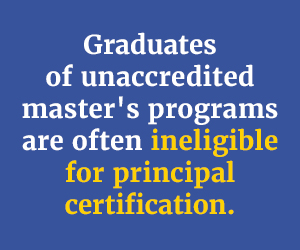
Accreditation ensures that your education is delivered by a reputable institution qualified to prepare you for work in your chosen field. As a result, local school districts and other employers favor job candidates from accredited schools. State education boards do as well, and graduates of unaccredited master's programs in educational leadership are often ineligible for principal certification.
Aside from affecting your education and career, accreditation impacts your financial aid as well. Students enrolled in unaccredited programs aren't eligible for federal and state funding, or military education benefits. You can avoid questionable universities and their master's programs with a little homework. The U.S. Department of Education (DOE) offers a searchable database that allows you to check the accreditation status of any school you are interested in before you enroll.
What Are the Admission Requirements for a Master's in Ed Leadership?
Because every university is different, admission requirements will vary depending on where you apply. That said, the general criteria are somewhat consistent. M.Ed. programs in educational leadership often ask for some combination of the following:
Aside from affecting your education and career, accreditation impacts your financial aid as well. Students enrolled in unaccredited programs aren't eligible for federal and state funding, or military education benefits. You can avoid questionable universities and their master's programs with a little homework. The U.S. Department of Education (DOE) offers a searchable database that allows you to check the accreditation status of any school you are interested in before you enroll.
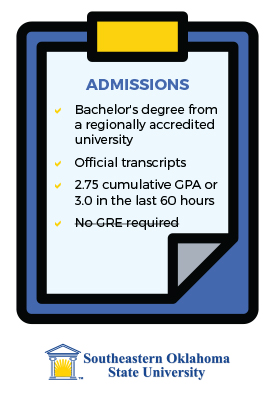
- Bachelor's degree from an accredited college or university
- Grade point average (GPA) that meets program standards
- Valid teaching certificate
- Teaching experience (documented by service records)
- Resume or curriculum vitae
- Letters of recommendation or professional references
- A personal statement or letter of application
- GRE or MAT test scores
Applicants to Southeastern's M.Ed. in Educational Leadership program don't need to submit GRE or MAT scores. A bachelor's degree from a regionally accredited university is required, as is a minimum 2.75 overall GPA or minimum 3.0 GPA in the last 60 hours of undergraduate courses.
If your overall GPA is between 2.0 and 2.74, you can still apply, but you'll also need to submit a current resume, one professional letter of recommendation and a letter of application outlining your career goals. Professional track applicants must have two years of experience as well. Additional admissions details for the academic and professional tracks are available online.
Which M.Ed. Degree Track is Right for Me?
The right choice depends on your situation, career goals and where you want to work after graduation. At SE, both educational leadership tracks can help you prepare for principal certification testing in Oklahoma and for other careers in administration. Coursework may also align with certification requirements in other states, but check with your state board of education to confirm.

Southeastern's professional M.Ed. is designed exclusively for certified teachers and educators who are ready to pursue the principalship. The academic M.Ed. is for anyone interested in advancing their knowledge of K-12 administration, certified or not. Students in each program can complete an administrative internship as part of their studies, but academic track students have the option to substitute a course in school counseling, reading or assessment instead. This is one reason the academic M.Ed. can be a great choice for those interested in a broad range of administrative jobs, including coordinator or supervisor positions.
Either degree option can serve as your first step toward a doctorate as well, or a career as an education policy researcher or college professor. No matter which track you choose at SE, tuition rates, credit hour requirements and time commitments are identical, and you can complete your degree in as few as 12 months.
Which Courses Will I Take for a Master's in Educational Leadership?
Graduate courses in ed leadership are built for current and aspiring educators who plan to become effective administrators. Courses will vary by university, but most M.Ed. programs will cover subjects ranging from organizational development to school governance and operations. You'll also learn about evidence-based practice, educational research, curriculum design, school finance and budgeting.
The professional and academic master's tracks at SE share nine three-credit courses:

- Introduction to Education Research
- Fundamentals of Curriculum Development
- School Administration
- School & Community Relations
- Supervision of Instruction
- Public School Law
- School Operations Management
- Administration of Special Programs
- The School Principal
Each degree plan also features an administrative internship, but academic track students have the option of choosing any graduate level EDUC course; options include school counseling, assessment in counseling, technology, cultural awareness, special education and teaching strategies among others.

—Nada Al Khateeb, 2019 graduate, SE online M.Ed. in Educational Leadership-Academic Track
Is An Internship Required to Become a Principal?

It depends on your state. Many do require some form of administrative practicum or internship for principal certification, before you can take the state qualifying exam. Most states that do not have this requirement still expect principal candidates to have relevant experience in education, or to get it during the certification process.
Oklahoma, for example, does not have a specific internship requirement. However, programs that do not have an internship component cannot gain CAEP accreditation. Master's programs that give students the chance to complete one offer the best preparation for the role of principal. Both M.Ed. in Educational Leadership programs at Southeastern offer this opportunity, and an internship is required for students in the professional track.
Working directly with administrators at a local K-12 campus can also help you develop the experience and practical skills school districts look for in new principal applicants.
How Do Online Students Complete an Administrative Internship?
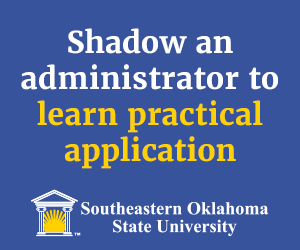
Each online master's program in school leadership has its own guidelines, but students can often select an internship site that's convenient to their location. Your placement and supervisor must be approved by your M.Ed. program, however. Since educational administrators work year-round, you may also be able to conduct much of your internship over the summer.
Educational leadership students at SE complete their internship by logging administrative activities over the course of six months. After you select an administrator to serve as your mentor, you'll shadow them to learn about the practical applications of leadership theory. Admin activities require access to parents, students, teachers and related data, so M.Ed. candidates must be employed in an appropriate educational setting to be eligible for internship hours. Speak with an SE enrollment specialist at 888-515-9100 to learn more.

"I want my students to be well grounded in the concept of servant leadership. I want my students to have real, practical ideas and field experiences for leadership."
—Dr. Jerry Stout, SOSU Educational Leadership Program Coordinator
How Do I Earn My Principal Certification?
Principal certification requirements change from state to state, but there are a few common threads you're likely to encounter. Many states, for instance, require a master's degree and a valid teaching certificate with two to five years of teaching experience. You'll also need to complete a state-approved principal preparation program. Once these criteria are met, most states require principal candidates to pass at least one licensing exam as well. These may be proprietary to your state, or a more universal standardized test.
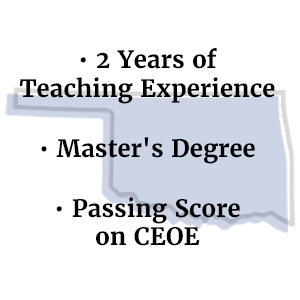
The Oklahoma State Department of Education typically requires two years of in-state teaching experience for principal certification, along with a master's degree from an approved leadership skills program in education administration. Candidates must also pass the appropriate Certification Examinations for Oklahoma Educators (CEOE). If you're short on teaching experience, the state offers an alternate route to licensure for applicants with relevant administrative experience.
Both tracks of Southeastern's M.Ed. in Educational Leadership are approved principal preparation programs that qualify students to take licensure examinations in Oklahoma. Coursework may also prepare you for the exams required in other states (check with your state board of education to confirm eligibility).
Which Certification Exams are Required in Oklahoma?
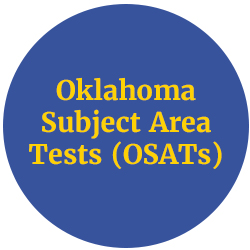
Principal candidates in Oklahoma take one of the following Oklahoma Subject Area Tests (OSATs): the Elementary Principal Comprehensive Assessment (045), the Middle Level Principal Comprehensive Assessment (046) and the Secondary Principal Comprehensive Assessment (047). Preparation materials for each exam offer sample questions, test-taking strategies and a detailed overview of weighted subject areas. According to the CEOE, all three tests consist of 50 selected-response questions (70% of your score) and two constructed-response assignments (30% of your score). All three also cover the same range of competencies:
- Visionary Leadership and Culture of Learning
- Instructional Leadership and Professional Development
- Organizational, Operational, and Resource Management
- Educational Contexts, Stakeholder Relationships, and Legal/Ethical Guidelines
- Educational Leadership
How Do I Find Principal Licensure Requirements for My State?

The Education Commission of the States offers a helpful index listing of principal certification standards across the nation, but your best bet is to contact the education credentialing agency in the state where you plan to apply for licensure. That's where you'll find the most up-to-date and accurate information. You can also confirm whether the certification program you're interested in is approved by the state for principal preparation. Some states may also require a licensure recommendation letter from your master's program.
By working directly with your state to determine eligibility requirements, you can select the master's program that works best for your career goals.
Students in SE's online M.Ed. in Educational Leadership programs may pursue licensure outside of Oklahoma as long as the degree's coursework aligns with the principal preparation standards approved by their state. At the end of 2019, students from over 25 states were enrolled in the online M.Ed. educational leadership program.
What Can I Do With a Master's in Educational Leadership?

A master's in educational leadership can lead to a number of different career paths. Many M.Ed. graduates become principals or assistant principals. Some work in other areas of school administration, as campus coordinators or program directors. The degree can even prepare you to join an education board or government agency, working on educational policy or consulting on education issues.
An M.Ed. can be the first step toward other careers as well. Experienced principals may go on to earn superintendent certification. You might also continue on to your doctorate, or work as a college professor. In other words, school leaders wear a lot of hats, but the one thing they have in common is a drive to positively impact learning outcomes by supporting teachers, students and the wider community.
What's the Average Salary for K-12 Administrators?

According to U.S. Bureau of Labor Statistics (BLS), the mean wage for elementary and secondary school administrators is $98,220, encompassing a range of positions from the campus to superintendent level. Given the many career options available to ed leadership grads, salaries can vary widely. The amount you might expect to earn will depend on your job title and experience, as well as your state, district and school assignment.
How Much Do Principals Make?
The latest BLS data (May 2018) indicates that principals earn a median wage of $95,310 per year. This number considers principals working at all levels of K-12 education, but the BLS also reports salaries by category. The median wage for public school principals is $96,760 annually, and for private school principals it's $84,990 per year. While the BLS doesn't break out salaries for assistant principals, ZipRecruiter (December, 2019) lists an average income of $70,802.
These salaries only represent base pay. Some districts offer performance-based bonuses that can add to your income each year. Incentives may also be awarded to principals who manage high-need campuses or administrators who lead their schools to academic excellence.
Learn more about our M.Ed. in Educational Leadership – Professional Track online program
Can Salaries Change From State to State?
Yes, and sometimes they change from district to district, even in the same city. Fluctuations can be attributed to cost of living, state funding and district funding. Demand can affect salary too, so large metropolitan areas and suburbs with rapid population growth may have more attractive pay rates.
The table below offers a sampling of mid-level salaries across state and district lines (ranges represent pay differentials between elementary, middle and high school principals):
| State | School District | Base Pay: Assistant Principals | Base Pay: Principals | |
|---|---|---|---|---|
|
Oklahoma |
Broken Arrow | $69,161 to $78,877 | $79,448 to $100,597 | |
|
Norman |
$76,303 to $87,278 | $82,887 to $98,852 | ||
| Texas | Houston | $74,783 to $82,776 | $75,813 to $117,300 | |
| Dallas | $ 77,000 to $88,000 | $100,000 to $128,000 | ||
| Florida | Miami-Dade | $76,792 to $96,792 | $98,639 to $129,639 | |
| Palm Beach | $78,885 to $107,730 | $96,000 to $131,250 | ||
| California | San Diego | $85,678 to $97,283 | $126,715 to $155,651 | |
| San Francisco | $113,561 to $119,445 | $127,499 to $142,622 | ||
What's the Career Outlook for Educational Leadership Grads?
Employment projections from the U.S. Bureau of Labor Statistics (BLS) for principals and other ed admin professionals are consistent with average rates of job growth in the U.S. economy. BLS data indicates that 23,000 jobs will be added each year through 2031, including positions at the elementary, middle and high school level.
However, job growth in some states will outpace the rest of the nation. In Texas, for example, the U.S. Department of Labor forecasts 14% job growth for K-12 school administrators through 2030.
21%
Texas is expected to see a 21% increase in administrator positions by 2028 – U.S. Department of Labor, 2018
How Much Does an Online Master in Educational Leadership Cost?

Tuition rates fluctuate across programs, and a low sticker price may not be all that it seems. That's because some universities charge online students additional fees for library use, operations, technology or facilities maintenance. This practice can add several thousand dollars on top of your tuition by the time you graduate. Out-of-state premiums are another factor that can cost you extra, whether they entail higher tuition or special fees.
Students enrolled in Southeastern's online M.Ed. programs in Educational Leadership pay the same tuition no matter where they live, and fees are included in the cost per credit hour. Tuition for professional and academic track students is also the same. Both programs cost $318 per credit hour and $9,450 total.
Now that you know what to look for, check out the table below to compare online graduate programs in educational leadership and administration:
| University | Tuition & Fees Per Credit Hour | Required Credit Hours | Estimated Total Cost |
|---|---|---|---|
|
Sam Houston State University |
$603.75 |
36 |
$21,735 |
|
University of Texas Rio Grande Valley |
$458.33 |
30 |
$13,749.90 |
|
University of North Texas |
$436.66 in-state $539.66 out-of-state*
|
30 |
$13,100 in-state $16,189.80 out-of-state* |
|
East Central University |
$318.25 |
32 |
$10,206.50 |
|
Fort Hays State University |
$287.75 |
36-39 |
$10,359-$11,222.25 |
|
Southeastern Oklahoma State University |
$318 |
30 |
$9,540 |
*Estimated based on per credit hour fees and tuition, does not include flat fees
Are Online Graduate Students Eligible for Financial Aid?

Online students enrolled in accredited colleges and universities can apply for financial aid. Eligibility is determined by your income, the cost of your education, and other factors. Simply fill out the Free Application for Federal Student Aid (FAFSA) on the Department of Education's website to get started.
Which Grants and Scholarships Are Available to Teachers?
With grants and scholarships, you can supplement your student loans or replace them altogether. Some states offer direct funding to educators pursuing a master's, or helpful search tools you can use to find scholarship opportunities. You may also be able to apply for career development grant programs, such as the one offered by the American Association of University Women.
Luckily, funding sources aren't limited to education-based grants. U.S. News & World Report offers a helpful scholarship guide for grad students, no matter their major. OKCollegeStart.org, a program of the Oklahoma State Regents for Higher Education, also offers information on variety of funding opportunities for graduate students.
Will an Online M.Ed. Qualify Me For Student Loan Forgiveness Programs?
It depends on the job you hold after graduation. The federal Public Service Loan Forgiveness program is a great option for those who qualify, including many ed admin professionals. You must work for a government entity or a nonprofit organization, and meet other criteria. Public schools count, as do private and charter schools designated as 501 (c)(3) nonprofits by the IRS.
The American Federation of Teachers also has a searchable database of loan forgiveness programs that can help you address any undergraduate loan debt you may have, even while studying for your graduate degree.
Do Military Education Benefits Apply to Online Programs?

They do, but only if your university is properly accredited. At the U.S. Department of Veterans Affairs website, you can confirm that your school is accredited and participates in the program.
While you're visiting the VA online, you may also want to check out their GI Bill Comparison Tool. It allows you to estimate your potential education benefit by the type of assistance you are eligible to receive.
Southeastern's Office of Veterans Services offers links, resources and assistance for online graduate students, including help with the benefits application process. Funds for tutoring may also available to qualified students through the Veterans Administration.
Can I Complete My M.Ed. in Less Than Two Years?
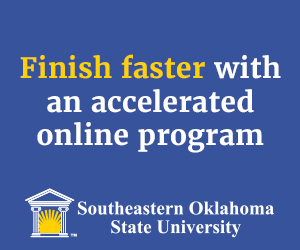
Traditional grad students taking a full course load on campus generally earn their M.Ed. in two years, but students in accelerated online programs can often finish more quickly. Some manage to complete their degree in a year. That's because accelerated courses range from five to eight weeks in length, instead of sixteen weeks over a long semester. Your time to degree, however, depends on your schedule. The more classes you take each term, the faster your path to graduation.
Courses in the online M.Ed. in Educational Leadership program at Southeastern Oklahoma State University are seven weeks in length. This makes it possible to complete your degree in as few as 12 months.
"I want my students to learn to think critically and to apply the content of my courses so they will be effective educational professionals."
—Dr. Stewart Mayers, Professor/Chair and Director of Teacher Education
How Do I Earn My Degree While Working Full Time?

Enrolling in an online program is one of the best ways to balance your education, career and personal life. That's because online courses are available 24/7. You can log on whenever it's most convenient for you. Whether you're a night owl or a morning lark, coursework is accessible from your computer, phone or tablet. Some grad students even log in during their lunch break.
Working full time while studying for your master's in ed leadership online can also be beneficial if you plan to complete an internship. By maintaining your employment as an educator, you'll have ready access to a school campus. That way, you can shadow administrators and apply your coursework as you learn.

—Nada Al Khateeb, graduate, SOSU online M.Ed. in Educational Leadership-Academic Track

I was working full time raising a family when I worked on my master's and my doctorate. I understand working, coaching, teaching, doing lesson plans, grading papers, and then on top of that, working in graduate programs. So in my class it's going to be very application-based. I won't ask you to do any work or any projects that are just for the project. I hope that it's something that you can take and then incorporate on your own campus, use in your own classrooms
—Dr. Jerry Stout, SOSU Educational Leadership Program Coordinator

Will I Need a Lot of Time to Study?

Because accelerated courses cover subjects at a rapid pace, you can move through the material faster than you might in a traditional classroom. However, you still need to devote adequate time to reading, assignments and other aspects of your studies to do well, especially at the master's level. It's a good idea to spend 10-12 hours per week studying for each three-credit course you take online.
If you're a teacher, you already know that different students excel in different subjects, so be sure to increase or decrease your study time depending on the course. Whether you study for a couple of hours a day or catch up on weekends, be sure to log in for a few minutes every day. This habit will keep you up to date on course announcements, class discussions and assignment deadlines
How Do Online Courses Work?

An online course is a virtual classroom. Once you're enrolled, you simply log in to your program's learning management system (LMS) to find your classes, then follow links to the syllabus and course modules to get started.
You can then view video lectures, participate in class discussion forums and upload assignments. You can also check grades online anytime. Because accelerated online classes cover subjects at a rapid pace, you may even be able to move through material faster than you might in a traditional course on campus.
If you need help, most schools provide technical support for online students. At SOSU, you can access Blackboard tech support online, and the IT Help Desk provides support via live chat, email and phone.
Will My Computer Work for Online Courses?

Many universities provide technology guidelines that can help you determine whether your computer is good to go for online learning. Otherwise, check to make sure your browser and operating system are up to date. Then confirm that word processing, presentation and spreadsheet programs will run properly on your current system. You'll also want to ensure that you can play videos, upload and download files, and use your webcam and microphone.
Some students just need a few upgrades here and there to get started if their laptop or desktop computer isn't new. You could also consider adding a new tablet to your technology setup.
The Center for Instructional Development and Technology at SOSU provides student resources that can help. In addition to system requirements for computers, you'll also find Android and iOS guidelines for mobile devices.
How Do I Reach Out to My Professors?
There are many options for communicating with your professors. You can contact them via email or directly from your online courses. Some faculty maintain virtual office hours for phone or video meetings, and some even prefer texting. Your professors will let you know the best way to contact them in the course syllabus. Regardless of how you interact with your instructors, you can expect a timely response, often within 24 to 48 hours.

"I want my students to learn to think critically and to apply the content of my courses so they will be effective educational professionals."
—Dr. Stewart Mayers, Professor/Chair and Director of Teacher Education

How Do Online Professors Work With Graduate Students?
Professors work with grad students in much the same way online as they do in the traditional classroom. You'll still get plenty of time to go over course material, and receive similar feedback on assignments. The main difference is that you can get together using webchat, or have a conversation on the course discussion board, at any point during the week. Which means you never have to hold your questions until the next class meeting.
Most online professors in ed leadership started their careers on the front lines of education, so they can also understand the needs of teachers and other working students, and relate to their experience. You'll find they are just as passionate about mentoring master's students and helping them grow in the profession as instructors in on-campus M.Ed. programs.

"I want my students to be well grounded in the concept of servant leadership. I want my students to have real, practical ideas and field experiences for leadership."
—Dr. Jerry Stout, SOSU Educational Leadership Program Coordinator
Are There Any Student Services Available to Online Students?

Aside from technical support, online students often enjoy digital research access through the campus library. At most schools, you can search academic databases, checkout e-books and work with librarians via phone, email or chat.
SOSU's Henry G. Bennett Memorial Library also offers research tutorials, and the university provides array of other support resources such as tutoring and tech support for online students. SOSU's online orientation also helps students can become familiar with the LMS and course navigation before their first class.
When Can I Enroll?
In many online M.Ed. programs, accelerated courses run on a half-semester schedule. Since most programs accept applications throughout the year, students can often enroll within a few weeks of acceptance.
In SOSU's online M.Ed. in Educational Leadership programs, students have six opportunities to enroll throughout the year. This means you can get started earning your degree right away. Apply anytime.

—Nada Al Khateeb, graduate, SOSU online M.Ed. in Educational Leadership-Academic Track
Sources
American Association of University Women: Career Development GrantsAmerican Federation of Teachers: Loan Forgiveness and Funding Opportunities
Broken Arrow Public Schools: Administrative Salary Schedule 2019-2020
Certification Examinations for Oklahoma Educators (CEOE):
Elementary Principal Comprehensive Assessment (045)Middle Level Principal Comprehensive Assessment (046)
Program and Test Information
Secondary Principal Comprehensive Assessment (047)
Council for the Accreditation of Educator Preparation (CAEP)
Dallas ISD: Compensation Resource Book 2019-2020
Education Commission of the States:
50-State Comparison, School Leader Certification and Preparation Programs50-State Comparison: What Are the Initial School Leader Certification Requirements?
Higher Learning Commission (HLC)
Houston Independent School District Compensation Manual 2019-2020
Miami-Dade School District: 2018-2019 Managerial Exempt Salary Schedule
Norman Public Schools: Administrative Salary Schedule
OKCollegeStart.org
Oklahoma State Regents for Higher Education
Oklahoma State Department of Education: Certification Requirements
The School District of Palm Beach County:
Assistant Principal Salary SchedulePrincipal Salary Schedule
San Diego Unified School District: Site Admin Salary Plan
San Francisco Unified School District: Labor Contracts and Salary Schedules
U.S. Bureau of Labor Statistics:
Occupational Employment Statistics: Education Administrators, All OtherOccupational Outlook Handbook: Elementary, Middle, and High School Principals
U.S. Department of Education:
Database of Accredited Postsecondary Institutions and ProgramsFree Application for Federal Student Aid (FAFSA)
Loan Rehabilitation
How Much Can I Borrow?
Manage Loans: Get Temporary Relief
Public Service Loan Forgiveness
U.S. Department of Labor: Education Administrators, Elementary and Secondary School
U.S. Department of Veterans Affairs (VA):
GI Bill Comparison ToolWEAMS Institution Search
U.S. News & World Report: How to Find Free Money for Grad School
ZipRecruiter: Assistant Principal Salary